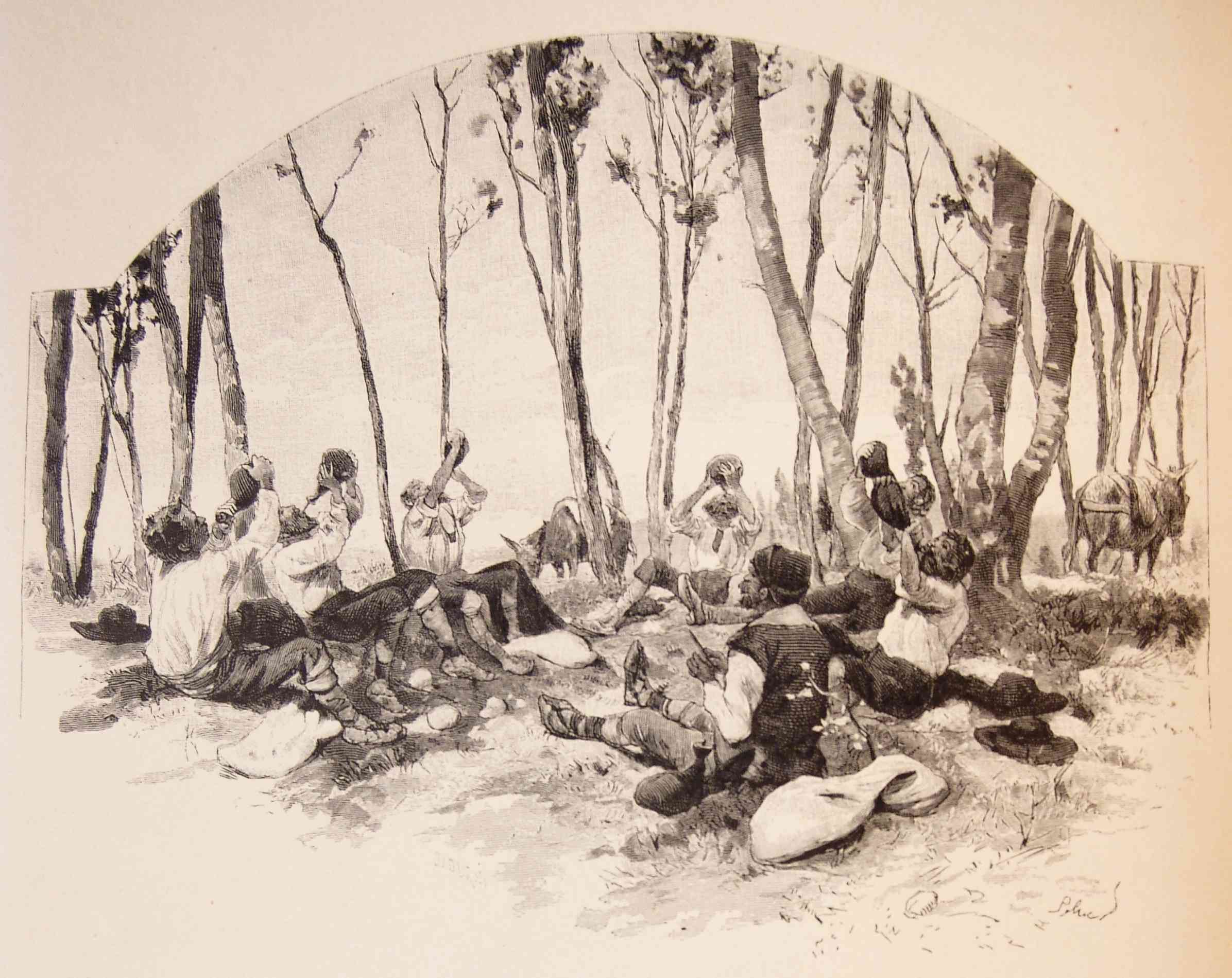Ricote (Don Quixote) on:
[Wikipedia]
[Google]
[Amazon]
:'' Ricote is also a village formerly inhabited by Moriscoes.''
Ricote is a fictional character who is referred to in  When Sancho leaves Barataria, he meets Ricote,''Don Quixote de la Mancha'' - Part Two
When Sancho leaves Barataria, he meets Ricote,''Don Quixote de la Mancha'' - Part Two
Chapter LIV
/ref> returning in a group of
/ref> Sancho and Don Quixote meet Ricote and his daughter Ana Félix in Barcelona. She is a fervent Christian and has been rescued from Berbery by a young noble neighbour from Sancho and Ricote's village. Her beauty and sincere faith convinces the authorities to arrange the re-admission of the Ricotes in Spain.
Miguel de Cervantes
Miguel de Cervantes Saavedra ( ; ; 29 September 1547 (assumed) – 22 April 1616 Old Style and New Style dates, NS) was a Spanish writer widely regarded as the greatest writer in the Spanish language and one of the world's pre-eminent novelist ...
' novel ''Don Quixote
, the full title being ''The Ingenious Gentleman Don Quixote of La Mancha'', is a Spanish novel by Miguel de Cervantes. Originally published in two parts in 1605 and 1615, the novel is considered a founding work of Western literature and is of ...
''. He was a wealthy (''rico
The Racketeer Influenced and Corrupt Organizations (RICO) Act is a United States federal law that provides for extended criminal penalties and a civil cause of action for acts performed as part of an ongoing criminal organization.
RICO was ...
'' meaning "rich" unloved Spanish
Spanish might refer to:
* Items from or related to Spain:
**Spaniards are a nation and ethnic group indigenous to Spain
**Spanish language, spoken in Spain and many countries in the Americas
**Spanish cuisine
**Spanish history
**Spanish culture
...
) Morisco
''Moriscos'' (, ; ; "Moorish") were former Muslims and their descendants whom the Catholic Church and Habsburg Spain commanded to forcibly convert to Christianity or face compulsory exile after Spain outlawed Islam. Spain had a sizeable Mus ...
shopkeeper
A shopkeeper is a retail merchant or tradesman; one who owns or operates a small store or shop. Generally, shop employees are not shopkeepers, but are often incorrectly referred to as such. At larger companies, a shopkeeper is usually referred t ...
and old friend of Sancho Panza
Sancho Panza (; ) is a fictional character in the novel ''Don Quixote'' written by Spain, Spanish author Miguel de Cervantes, Miguel de Cervantes Saavedra in 1605. Sancho acts as squire to Don Quixote and provides comments throughout the novel, ...
, who was banned from Spain in 1609 like all Moriscos. The expulsion of the Moriscos was a highly topical issue at the time when ''Don Quixote'' was written—occurring in between the publication of the first part (1605) and the second one (1615).
In 2006 Govert Westerveld asserted that the Morisco Ricote came from the Ricote Valley,Westerveld, Govert (2007). ''Miguel de Cervantes Saavedra, Ana Félix y el morisco Ricote del Valle de Ricote en "Don Quijote II" del año 1615''. (capítulos 54, 55, 63, 64 y 65). which hypothesis was confirmed by Francisco Márquez Villanueva.Marquez Villanueva, Francisco (2010) ''Moros, moriscos y turcos en Cervantes. Ensayos críticos.'' .
 When Sancho leaves Barataria, he meets Ricote,''Don Quixote de la Mancha'' - Part Two
When Sancho leaves Barataria, he meets Ricote,''Don Quixote de la Mancha'' - Part TwoChapter LIV
/ref> returning in a group of
German
German(s) may refer to:
* Germany, the country of the Germans and German things
**Germania (Roman era)
* Germans, citizens of Germany, people of German ancestry, or native speakers of the German language
** For citizenship in Germany, see also Ge ...
pilgrim
The asterisk ( ), from Late Latin , from Ancient Greek , , "little star", is a typographical symbol. It is so called because it resembles a conventional image of a heraldic star.
Computer scientists and mathematicians often vocalize it as ...
s.
After meeting Sancho again, Ricote tells him that after the expulsion, he went north while his family went to Algiers
Algiers is the capital city of Algeria as well as the capital of the Algiers Province; it extends over many Communes of Algeria, communes without having its own separate governing body. With 2,988,145 residents in 2008Census 14 April 2008: Offi ...
.
Ricote and the pilgrims share food with Sancho, including "the black dainty called,
they say, caviar
Caviar or caviare is a food consisting of salt-cured roe of the family Acipenseridae. Caviar is considered a delicacy and is eaten as a garnish or spread. Traditionally, the term caviar refers only to roe from wild sturgeon in the Caspi ...
".
He tells him that he came back to recover some gold
Gold is a chemical element; it has chemical symbol Au (from Latin ) and atomic number 79. In its pure form, it is a brightness, bright, slightly orange-yellow, dense, soft, malleable, and ductile metal. Chemically, gold is a transition metal ...
which he had buried near his house. Ricote recognizes to be a bad Christian and then asks Sancho to help him carry the money away.
But Sancho refuses as it would be a treason to his king.
LaterChapter LXIII/ref> Sancho and Don Quixote meet Ricote and his daughter Ana Félix in Barcelona. She is a fervent Christian and has been rescued from Berbery by a young noble neighbour from Sancho and Ricote's village. Her beauty and sincere faith convinces the authorities to arrange the re-admission of the Ricotes in Spain.
See also
* As a contrast in the perception of Moriscos, the first part of ''Don Quixote'', published in 1605, is said by Cervantes to have been an Arabic found manuscript by some Cide Hamete Benengeli, translated for Cervantes by a Morisco. * List of characters in ''Don Quixote''References and notes
Don Quixote characters Fictional Spanish people Islam in Spain Literary characters introduced in 1615 Fictional shopkeepers Male characters in literature Moriscos Fictional characters from the 17th century {{novel-char-stub